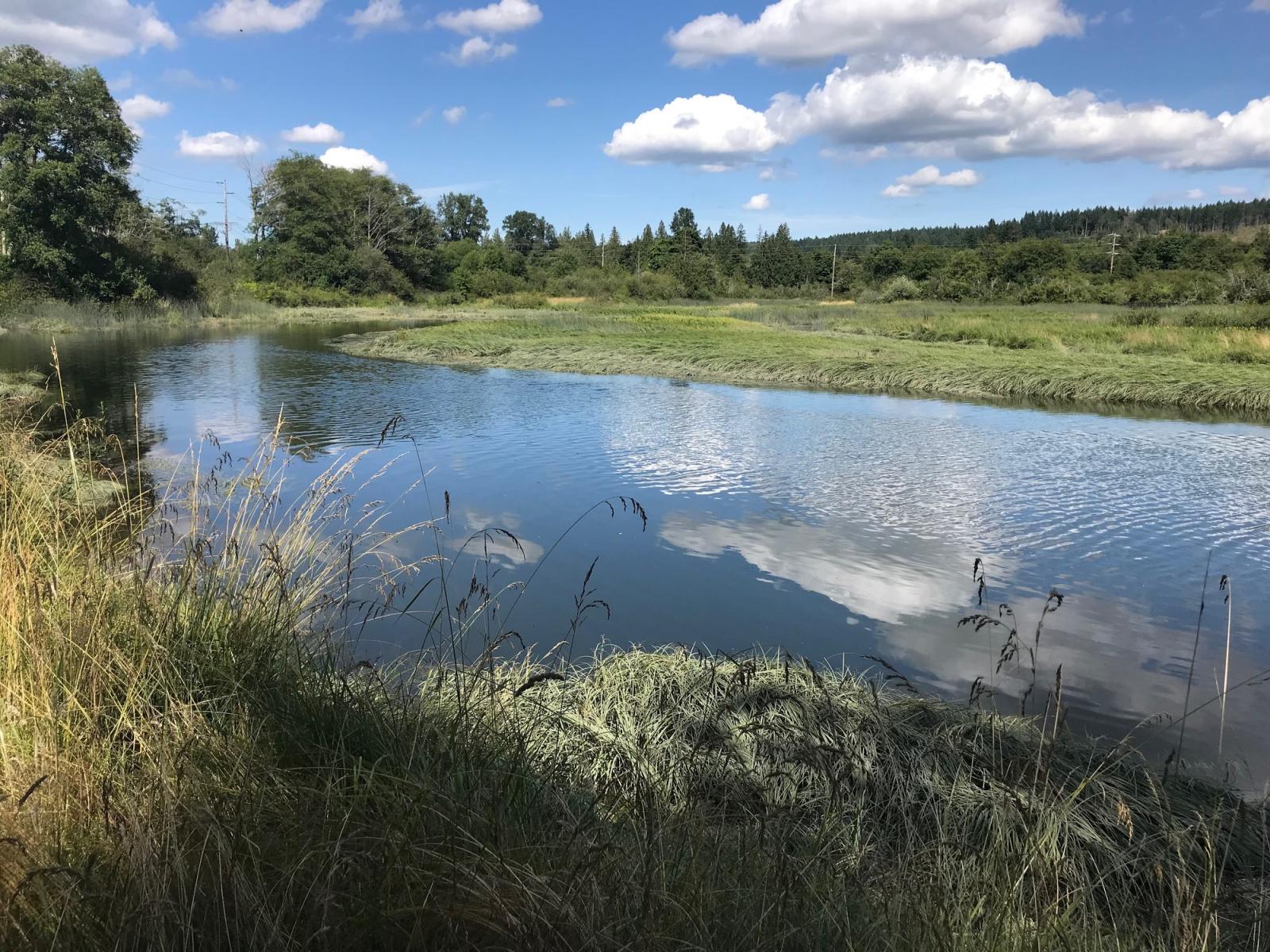
The Union River Unit at the inland terminus of Hood Canal, which is part of a larger complex of conservation and recreation lands that encompass Lynch Cove, the mouth of the Union River, and surrounding forested shorelines. The unit is managed for multiple uses, including birdwatching, nature study, waterfowl hunting, and estuary habitat restoration. This unit also features an interpretive trail. Local habitat and recreation management partners include the Hood Canal Salmon Enhancement Group The Salmon Center and the North Mason School District.
The Union River Unit is located in Belfair in Mason County. The unit can be acessed by foot via the shared entrance to the Salmon Center (600 NE Roessel Road) in Belfair.
The Union River Unit is within the Hood Canal watershed. Adjacent lands include properties protected by a land trust and school district.
This unit is part of the South Puget Sound Wildlife Area.
Game Management Units: 633, 627
Getting there
Maps and directions to WDFW-managed access points for this unit. Opens Google Maps in a new tab.
Recreation and public access
A Discover Pass is required on WDFW lands -- including water access areas, wildlife areas, and campgrounds -- unless you already have a Vehicle Access Pass issued with the purchase of an eligible hunting or fishing license. Recreate responsibly on public lands: please know the Public Conduct Rules.
Public facility information:
- Parking area
- Restroom
- Informational kiosk
- Interpretive trail
- Hand-launch boat access
Recreation and access advisories
- Daylight hours only.
- Dogs are not allowed on trails.
- Motorized vehicles and bicycles are prohibited.
- Open fires and fireworks are prohibited.
- Overnight parking and camping are prohibited.
- Be watchful of the tides and small channels to cross on the way out and back in.
- This site is managed for multiple uses to facilitate compatible public use opportunities--specific rules and conditions apply to this site.
Hunting
This unit is popular for waterfowl hunting. WDFW provides blinds for this purpose. Check this map for blind locations.
Hunting advisories
- A hunting area restriction exists on this unit. It is unlawful to hunt waterfowl, coot, or snipe except in blinds designated by the department (WAC 220-416-080).
- The northern-most blind, which is the walk-in blind, is currently closed to the public.
- The four blinds were constructed by local members of Ducks Unlimited and the Washington Waterfowl Association and are available on a first come basis.
- All shooting should be directed towards Lynch Cove.
Fishing
This unit provides access to Union River. A small parking area with a hand-launch boat access is located on State Route 300 about 0.7 mile southwest of Belfair.
Wildlife viewing
Search for potential birding opportunities on or near a wildlife area unit by using eBird Northwest, a citizen science database portal that provides freely-shared bird lists at 'hotspots' and interactive maps plus other birding information updated daily.
Other recreational opportunities
This unit offers an interpretive trail, including a one-mile loop; the trail is accessible by foot via the shared entrance to The Salmon Center at 600 NE Roessel Road in Belfair.
Motorized vehicles are prohibited.
Conservation
This unit includes estuarine habitat associated with Lynch Cove and the mouth of the Union River, plus has surrounding forested shorelines, offering important habitats for a variety of salmon.
Special habitats and species
This unit also provides habitat for many common species found throughout western Washington such as deer, elk, fox, bobcat, coyote, hare, raccoon, river otter, beaver, muskrat, small rodents, shrews, hawks, owls, ducks, geese, swallows, red-winged blackbird, killdeer, woodpeckers and a variety of songbirds.
Conservation goals
- Maintain healthy populations of game and non-game species
- Protect and enhance Endangered Species Act listed fish habitat
- Protect and restore native plant communities
- Preserve habitat and species diversity for both fish and wildlife resources
This unit also provides habitat for many common species found throughout western Washington such as deer, elk, fox, bobcat, coyote, hare, raccoon, river otter, beaver, muskrat, small rodents, shrews, hawks, owls, ducks, geese, swallows, red-winged blackbird, killdeer, woodpeckers and a variety of songbirds.
- Maintain healthy populations of game and non-game species
- Protect and enhance Endangered Species Act listed fish habitat
- Protect and restore native plant communities
- Preserve habitat and species diversity for both fish and wildlife resources
Land stewardship
The Union River Unit was purchased for estuary protection, and as a fish and wildlife preserve, to protect salmon and waterfowl, on the Union River delta.
Acquisition history
The parcels making up this area were purchased between 1956 and 2023.
| Funder | Fund |
|---|---|
| Private Grantor | Private Donation |
| U.S. Congress programs | National Fish & Wildlife Foundation Funds |
| US Fish and Wildlife Service | National Coastal Wetlands Conservation Grant |
| US Fish and Wildlife Service | National Fish & Wildlife Foundation Funds |
| US Fish and Wildlife Service | North American Wetlands Conservation Program |
| WA Dept of Fish and Wildlife | State Migratory Waterfowl Fund |
| WA Dept of Fish and Wildlife | WDFW Game Fund (now Wildlife Fund) |
| WA Recreation and Conservation Office | Aquatic Lands Enhancement Account |
| WA Recreation and Conservation Office | Washington Wildlife and Recreation Program |
Management planning
South Puget Sound Wildlife Area Management Plan (January 2022)
Every eight to 10 years, the Washington Department of Fish and Wildlife (WDFW) revises management plans for each of its 33 wildlife areas to document current conditions, address new agency initiatives, and identify new management priorities and actions. In between those major revisions, WDFW updates plans every two years to outline short-term objectives and accomplishments. In 2014, WDFW began the process of updating existing plans, many of which were written in 2006. The new plans are being developed with significant public participation and input.
Planning Advisory Committee
South Puget Sound Wildlife Area Advisory Committee